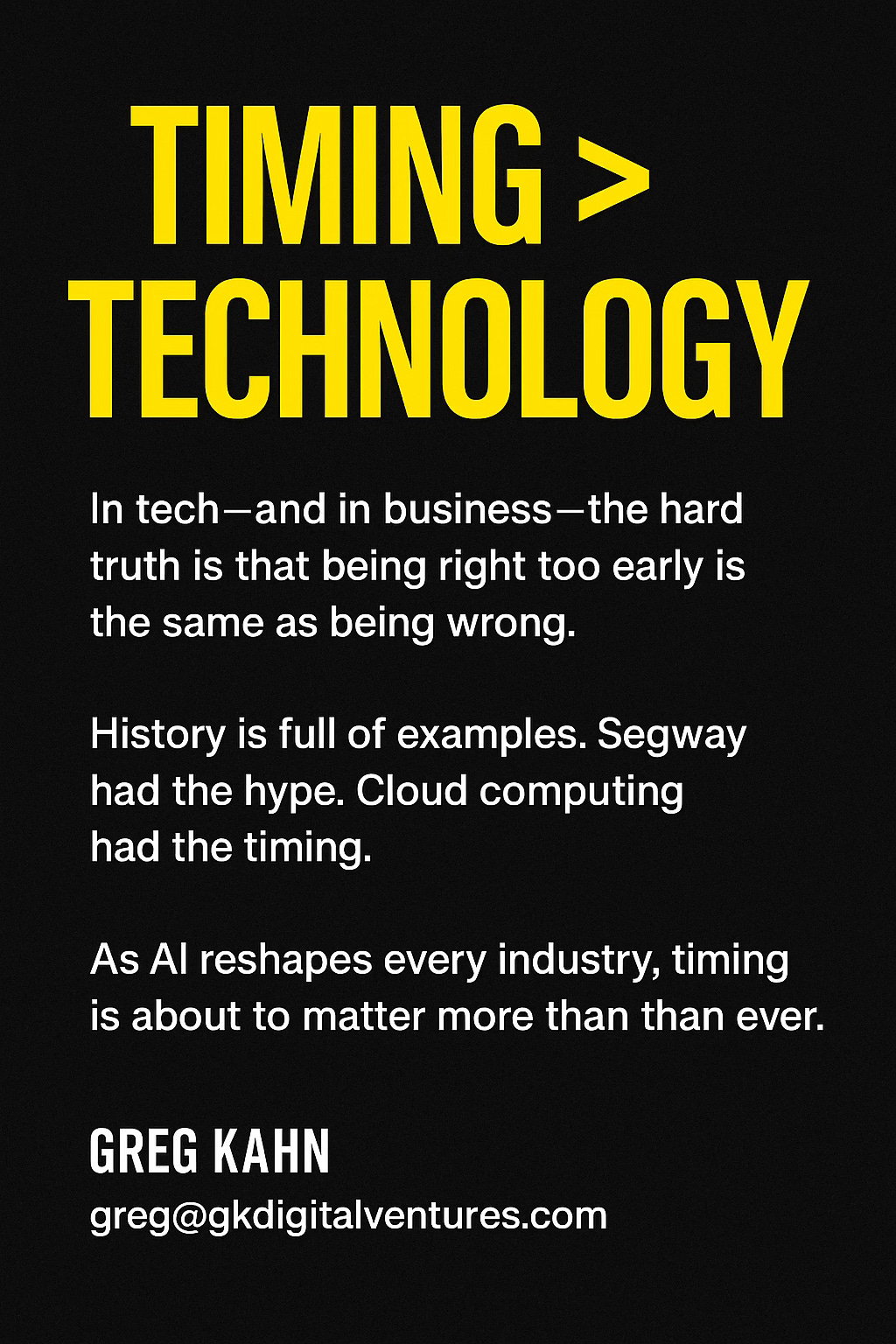Timing is Everything: Why Some Technologies Soar and Others Fade
From ChatGPT to Quibi, success isn’t just about innovation — it’s about knowing when the world is ready.
In tech—and in business—the hard truth is that being right too early is the same as being wrong.
You can have the best idea, the most advanced technology, the clearest vision.
But if the world isn't ready—if the infrastructure, the policy, or the behavior shifts haven't caught up—you'll miss the moment.
History is full of examples.
Segway had the hype.
Cloud computing had the timing.
As AI reshapes every industry, timing is about to matter more than ever.
🕰️ When Timing Wins
Some technologies caught the wave at exactly the right moment:
ChatGPT: Not the first chatbot — but launched when AI literacy was rising, APIs were developer-ready, and cloud infrastructure could support mass scaling.
Tesla: EVs existed for decades. Tesla thrived by tapping into climate consciousness, luxury consumer demand, and a mature battery supply chain.
Apple Watch: Smartwatches struggled until health tracking — sleep, heart rate, fitness — became a daily expectation.
Waymo: After years of autonomous hype, Waymo leaned into gradual deployment, matching public tolerance and regulatory reality.
Netflix: Seamlessly shifted from DVDs to streaming just as broadband adoption hit critical mass.
Roblox: Built a community-first platform before “metaverse” became a buzzword — then scaled when social gaming behaviors matured.
🚫 When Technology Arrives Too Soon
Others had the right technology but the wrong timing:
Google Glass: Technologically impressive, but socially awkward and privacy-invasive before society could digest it.
Juicero: Smart appliance innovation nobody actually needed — or asked for.
Hoverboards: Viral for a moment, but collapsed under safety issues, regulatory hurdles, and durability problems.
Quibi: Big names, big budget — but missed the mobile video behavior shift to TikTok-style content.
Theranos: A heartbreaking example of science fiction presented as science fact, far ahead of what technology could deliver.
NFTs: Exploded in hype — but crashed before broad, lasting consumer use cases were developed.
🔄 Some Technologies Come Back
Timing doesn’t just kill ideas.
Sometimes it delays them — until the world is ready.
Crypto: After boom-and-bust cycles, stablecoins and real enterprise blockchain applications are gaining ground.
Smart Glasses: Ray-Ban Meta smart glasses feel more "normal" in a world used to wearables, AR filters, and voice assistants.
🧠 Consumer Behavior is the X-Factor
Technology doesn’t win because it’s impressive.
It wins because it adapts to how people actually live, work, and connect.
Startups often design for the "ideal future customer" — not the real-world user today.
The breakthrough technologies meet users where they are and make the leap feel natural.
Adaptability always beats arrogance.
🔎 Adapt or Fade
The reality is simple:
You can invent the future — but if you don't time it right, someone else will.
The winners of the next decade won't just be the boldest innovators.
They'll be the most adaptable.
They'll listen.
They'll pivot.
They'll recognize when infrastructure, behavior, and policy are ready — and when they aren't.
In a noisy world of "firsts," it's the adapters who will endure.
Let’s Continue the Conversation
I’d love to hear your thoughts.
If you’re interested in exploring how these emerging technologies can impact your business, please reach out at greg@gkdigitalventures.com.


